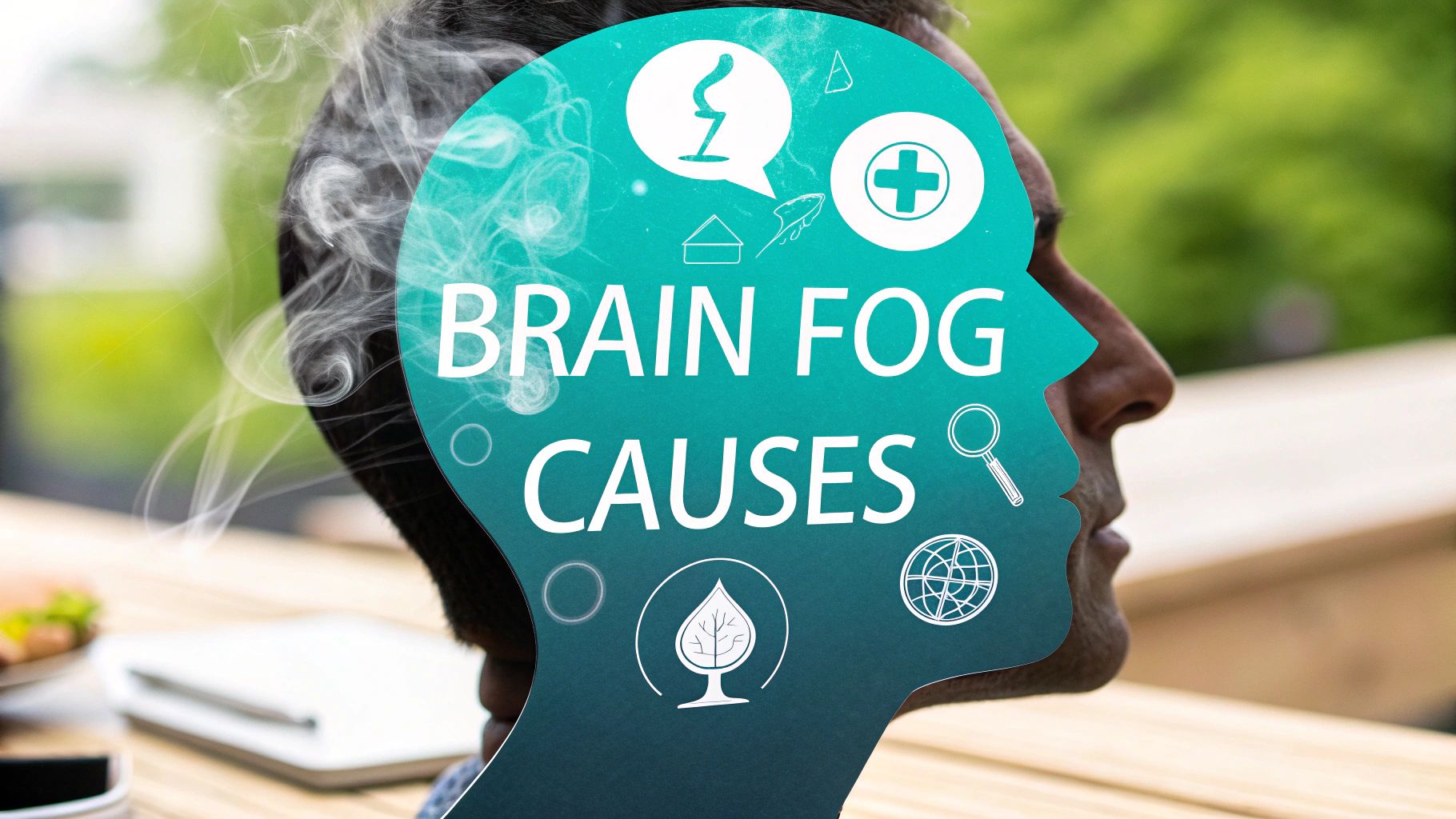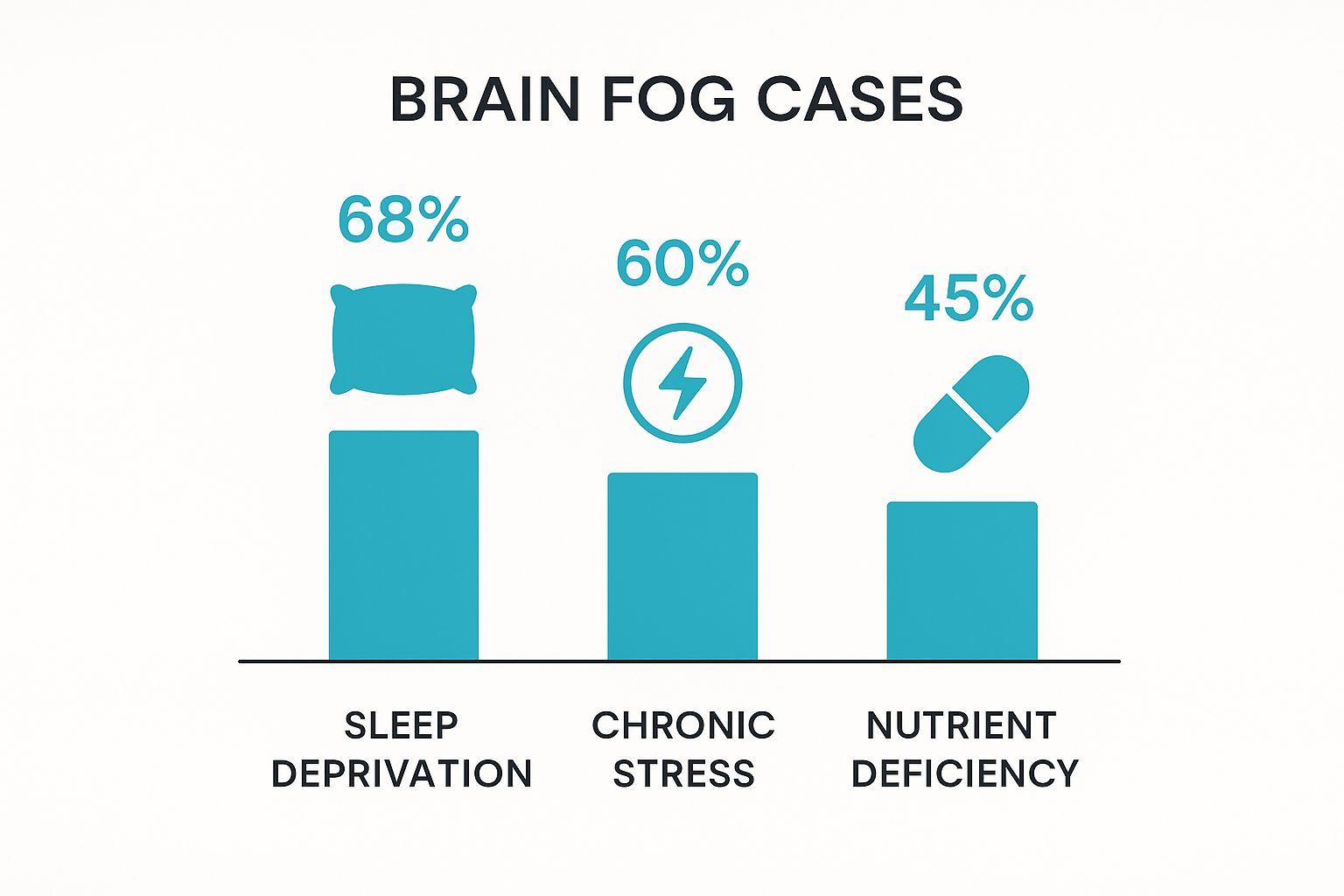

· By Annemarie
What Causes Brain Fog? Discover Key Factors and Remedies
We’ve all been there. That fuzzy, slow-motion feeling where your thoughts just won't connect. It's like your brain has a terrible internet connection—you know the information is in there somewhere, but trying to access it is slow, laggy, and just plain frustrating.
This isn't a medical condition itself, but a frustrating cluster of symptoms: mental fatigue, forgetfulness, and a real struggle to concentrate. It's your body's check-engine light, signaling that something is off-balance and messing with your mental clarity.
Decoding the Haze: What Brain Fog Really Feels Like

That mental static you can't seem to shake? It's a very real thing. While the feeling is different for everyone, the triggers are often surprisingly tangible. The first step to clearing that haze is figuring out what’s causing it in the first place.
The Most Common Triggers
More often than not, the culprits behind brain fog are hiding in plain sight. They usually fall into a few key areas, which we'll dive into throughout this guide.
- Lifestyle Factors: Simple things like not getting enough sleep, being chronically stressed out, not drinking enough water, or skipping your workouts can throw your brain's chemistry way off. Each one of these can disrupt the delicate balance your brain needs to fire on all cylinders.
- Diet and Nutrition: Your brain runs on the fuel you give it. A diet heavy in processed foods and sugar can spark inflammation and mess with your neural pathways. Not getting enough key nutrients, like B vitamins, is another common trigger.
- Medical Conditions: Sometimes, persistent brain fog is a sign of something deeper going on. Conditions like autoimmune diseases, hormonal imbalances, chronic fatigue syndrome, and post-viral issues (think long COVID) are notorious for causing serious cognitive slowdown.
- Hangovers and Dehydration: This is the classic, short-term cause we all know too well. A night of drinking leaves you dehydrated and inflamed, which is a perfect recipe for feeling mentally sluggish and unfocused the next day.
Brain fog isn’t just “in your head.” It’s a physiological response to internal and external stressors. Identifying your specific triggers is crucial for regaining mental clarity and taking control of your cognitive health.
By looking at these different areas of your life, you can start to connect the dots between your daily habits and how you feel mentally. This guide will give you a quick rundown of these triggers, helping you pinpoint potential sources of your brain fog and setting the stage for a much clearer tomorrow.
Common Brain Fog Triggers at a Glance
To make it even easier to spot potential issues, here's a quick summary of the main culprits we've discussed. Think of this as your cheat sheet for identifying what might be clouding your mind.
| Category | Primary Examples | Impact on Cognition |
|---|---|---|
| Lifestyle Habits | Poor sleep, chronic stress, dehydration, lack of exercise | Disrupts neurotransmitter balance, reduces blood flow to the brain, and increases cortisol levels, leading to fatigue and poor focus. |
| Diet & Nutrition | High-sugar diets, processed foods, nutrient deficiencies (e.g., Vitamin B12, Omega-3s) | Causes inflammation, oxidative stress, and unstable energy levels, impairing memory and concentration. |
| Hangovers | Alcohol consumption, dehydration, inflammation | Dehydrates brain cells and causes an inflammatory response, resulting in next-day mental slowness, headaches, and difficulty concentrating. |
| Medical Conditions | Autoimmune diseases, hormonal imbalances, long COVID, chronic fatigue syndrome | Creates systemic inflammation and hormonal disruptions that directly interfere with brain function and energy production. |
Taking a closer look at this table can help you start identifying patterns in your own life. Recognizing these triggers is the first, most important step toward shaking off the fog for good.
What's Really Going On? A Look at the Biological Roots of Brain Fog
To get a real handle on brain fog, we have to look past our daily routines and peek under the hood at your body's internal wiring. That fuzzy, disconnected feeling isn't just in your head; it’s a very real sign that something physiological is out of whack deep inside your system.
Think of your brain as a high-performance orchestra where every single instrument needs to be perfectly in tune. When your internal biology gets thrown off, the result is less of a symphony and more of a jumbled, chaotic noise.
One of the biggest culprits here is systemic inflammation. Picture your brain’s communication network as a bunch of clear, open highways. Inflammation is like a massive, multi-car pile-up clogging every single road, creating static and jamming up the flow of information. This "neural static" slows down the signals between your brain cells, which is why it suddenly becomes so hard to form a clear thought, pull up a memory, or just stay focused.
The Role of Hormones and Neurotransmitters
Your body’s chemical messengers—hormones and neurotransmitters—are basically the conductors of your mental orchestra. If they’re off-key, the entire performance falls apart.
- Cortisol Imbalance: When you’re constantly stressed, your body stays stuck in "fight or flight" mode, flooding your system with the stress hormone cortisol. Over time, all that excess cortisol can mess with the hippocampus, your brain's memory hub, leading directly to that forgetful, foggy state.
- Thyroid Dysfunction: Your thyroid gland is like your body's metabolic thermostat. If it’s underactive (a condition called hypothyroidism), it slows everything down, and that includes your cognitive processing speed. It can leave you feeling sluggish, unmotivated, and just plain mentally dull.
- Neurotransmitter Disruption: Brain chemicals like dopamine and serotonin are absolutely vital for focus, mood, and motivation. When these get out of balance, your ability to concentrate and process what’s going on around you can take a serious hit, adding another layer to that brain fog.
This is exactly why long periods of stress or underlying health problems often show up first as a drop in mental sharpness.
Post-Viral Syndromes and That Lingering Fog
The link between being sick and feeling foggy is becoming crystal clear, especially when we talk about post-viral syndromes. After your body fights off an infection, your immune system can sometimes stay in overdrive. This can lead to persistent, low-grade inflammation that has a direct impact on the brain.
It’s one of the main reasons why conditions like long COVID are so often linked with severe, lasting cognitive problems.
Brain fog isn't just "in your head." It's a real physiological symptom. In fact, a study of over 25,000 people found that a staggering 28.2% reported experiencing it, with strong ties to conditions like migraines, chronic fatigue, and post-viral issues. It's a powerful reminder of how inflammation can directly disrupt how your brain works. You can explore the full study on brain fog prevalence and its causes to learn more.
This lingering inflammatory response can throw a wrench into everything from blood flow to the brain to the delicate balance of your autonomic nervous system. The result? A brain that feels perpetually exhausted and can’t even handle its most basic jobs efficiently. Understanding these biological roots is the first step in recognizing that brain fog is a valid signal from your body that something needs your attention.
How Your Lifestyle Can Create Mental Fog

While it's easy to blame brain fog on complex biological issues, the real culprits are usually hiding in plain sight. They’re woven right into our daily routines.
Think of your mental clarity as a finely tuned instrument. Your lifestyle choices are the hands that either keep it playing beautifully or knock it completely out of tune. Small habits that seem minor on their own can pile up over time, creating a serious cognitive drag that leaves you feeling slow, fuzzy, and unfocused.
The good news? These things are almost always within your control. Once you understand how your daily actions impact your brain, you can start making smart adjustments to clear the haze. Let’s break down four of the biggest lifestyle triggers.
The Impact of Poor Sleep
Sleep is anything but a passive activity for your brain. It's actually a critical maintenance period where your mind sorts through memories and—most importantly—clears out all the metabolic junk that builds up during the day. This cleanup is handled by something called the glymphatic system, which is basically a nightly deep-cleaning crew for your brain.
When you don't get enough quality sleep, that cleanup process gets cut short. The leftover metabolic gunk just hangs around, getting in the way of communication between your brain cells. The result is that classic next-day feeling of sluggishness, poor concentration, and difficulty stringing a thought together. It’s the direct result of a brain that didn’t get its nightly cleaning.
When Stress Becomes a Chronic Problem
A little bit of stress can be a good thing, a great motivator even. But chronic, unrelenting stress? That’s just toxic for your brain. When you're constantly on high alert, your body is pumping out the stress hormone cortisol. While it’s helpful for "fight or flight" moments, being exposed to high cortisol levels for too long starts to damage sensitive parts of the brain.
Specifically, it can mess with the function of the prefrontal cortex and hippocampus—areas that are essential for memory, focus, and decision-making. This hormonal flood is a huge reason why periods of high stress so often come with forgetfulness and an inability to focus on anything complex. Your brain is simply too busy managing a perceived threat to handle higher-level thinking.
Your brain on chronic stress is like a computer running too many background programs. All its processing power is being used up, leaving very little bandwidth for the tasks you actually want to focus on.
The Cost of a Sedentary Life
Your brain absolutely thrives on oxygen and nutrients, which get delivered by strong blood flow. One of the best ways to boost that circulation is good old-fashioned physical activity, making sure your brain gets all the resources it needs to fire on all cylinders. When you live a mostly sedentary life, blood flow can become sluggish, basically starving your brain of this essential fuel.
Regular exercise also triggers the release of BDNF (brain-derived neurotrophic factor), a protein that helps neurons grow and survive. Without it, your brain’s ability to adapt, learn, and maintain sharp connections starts to fade, contributing to that foggy feeling.
Dehydration's Surprising Effect on Your Mind
Your brain is about 75% water, so it probably won't surprise you that even mild dehydration can have a noticeable impact on how well it works. When you’re dehydrated, your brain tissue can literally shrink a bit, leading to fuzzy thinking, memory issues, and a tough time paying attention. It’s why a simple glass of water can sometimes feel like an instant mental reset.
This is also a major reason hangovers are so brutal on your focus. Alcohol is a diuretic, which means it makes you lose fluids way faster than normal, leading to significant dehydration. For anyone looking to stay sharp after a night out, learning how to prevent a hangover before drinking is a game-changer, and proper hydration is at the top of the list.
The Diet Connection: Uncovering Food-Related Triggers
What you eat has a massive, direct impact on how you think and feel. If your brain is a high-performance engine, then food is its fuel—and putting in the wrong kind will absolutely cause it to sputter and stall. It’s no surprise that dietary habits are so often at the root of what causes brain fog.
Picture a superhighway running from your gut to your brain. This connection, known as the gut-brain axis, is how your digestive system and your cognitive command center are in constant communication. When you eat foods that trigger inflammation, like heavily processed meals or sugary snacks, you're essentially creating a massive traffic jam on this highway.
That inflammatory response doesn't just stay in your gut; it sends out signals that can mess with your brain function, leading to that all-too-familiar feeling of mental slowness. At the same time, your gut is responsible for producing a huge chunk of your body's neurotransmitters, including about 95% of your serotonin, which is vital for mood and focus. An unhealthy gut can throw that production line into chaos, hitting your mental clarity hard.
Key Nutritional Deficiencies and Brain Fog
It’s not just about avoiding inflammatory foods. A simple lack of essential nutrients can also leave your brain struggling to keep up. Your mind relies on a steady stream of specific vitamins and minerals to fire on all cylinders.
If you’re dealing with persistent brain fog, deficiencies in these key areas are some of the most common culprits:
- B Vitamins: Vitamin B12, in particular, is absolutely critical for nerve health and producing energy in your brain cells. A shortage can lead directly to fatigue and memory problems.
- Omega-3 Fatty Acids: You’ll find these in fish and nuts. They are the fundamental building blocks for your brain tissue and are fantastic at reducing inflammation.
- Magnesium: This powerhouse mineral plays a huge role in nerve transmission and relaxation. When your levels are low, it often shows up as poor focus and mental fatigue.
While things like sleep and stress are huge factors, you can't overlook the nutrition piece of the puzzle. Just take a look at how diet stacks up against other major triggers for brain fog.

This really puts it into perspective. While sleep deprivation and stress are leading causes, nearly half of all brain fog cases are linked back to nutrient deficiencies. That just goes to show how critical your diet is for staying sharp. Making mindful food choices is genuinely one of the most effective ways you can start to clear the haze.
Brain-Boosting Foods vs. Brain-Draining Foods
To make it even clearer, let's break down the kinds of foods that either help or hinder your mental clarity. What you put on your plate can either fuel your brain for peak performance or bog it down.
| Food Type | Examples | Effect on Brain Health |
|---|---|---|
| Omega-3 Rich Foods | Salmon, walnuts, chia seeds, flaxseeds | Supports brain structure, reduces inflammation, and enhances cognitive function. |
| Antioxidant-Rich Foods | Blueberries, dark chocolate, spinach, kale | Fights oxidative stress and protects brain cells from damage. |
| Complex Carbohydrates | Oats, quinoa, sweet potatoes | Provides a steady, slow-release supply of glucose, the brain's primary fuel source. |
| Highly Processed Foods | Fast food, packaged snacks, sugary cereals | Triggers inflammation, spikes blood sugar, and contributes to mental sluggishness. |
| Sugary Drinks & Snacks | Soda, candy, pastries | Causes rapid blood sugar crashes, leading to energy dips and poor concentration. |
| Refined Carbohydrates | White bread, white pasta, white rice | Quickly converts to sugar, leading to brain fog and energy instability. |
Choosing whole, nutrient-dense foods is like giving your brain the premium fuel it needs to run smoothly. On the other hand, a diet heavy in processed junk is a recipe for mental traffic jams and that frustrating foggy feeling.
When Brain Fog Signals a Deeper Health Issue

While a few lifestyle tweaks can usually clear up a bit of fogginess, what happens when it just won't go away? Think of persistent brain fog as your body's check-engine light—it’s a clear signal that there might be a more significant, underlying health issue that needs a closer look.
It’s actually a surprisingly common thread that ties together many chronic conditions, showing up as a very real, tangible symptom of an internal imbalance.
This lingering mental haze is a big deal in chronic health. In fact, studies show that cognitive issues plague anywhere from 76% to 83% of people with fibromyalgia and around 38% of those with other inflammatory disorders. Often, the worse the fog, the more severe the illness, making it tough to focus, remember things, or make decisions. If you want to dig into the science, you can explore a detailed study on how brain fog presents across different medical conditions.
Common Conditions Linked to Brain Fog
So, if you’ve been eating well, sleeping enough, and staying hydrated, but your head still feels like it’s full of cotton, it’s worth asking if something else is going on. There are several medical conditions where brain fog isn't just a side effect—it's a primary symptom.
A few of the usual suspects include:
- Chronic Fatigue Syndrome (ME/CFS): This isn't just being tired. It’s a profound physical and mental exhaustion that rest simply doesn't fix.
- Autoimmune Diseases: Conditions like lupus or multiple sclerosis happen when the immune system gets its wires crossed and attacks healthy tissue. This can cause widespread inflammation that directly messes with brain function.
- Thyroid Disorders: An underactive thyroid (hypothyroidism) basically slows your entire metabolism down to a crawl, and that includes your brain.
- Post-Viral Illnesses: We’ve all heard about this with long COVID. The inflammation that sticks around after an infection can be a major cause of long-term cognitive problems.
Persistent brain fog, especially when it comes with other weird symptoms like extreme fatigue, joint pain, or sudden weight changes, is your cue to call a doctor. It’s not just in your head—it’s a valid symptom.
Of course, a bad hangover can make you feel this way, but the fog from a big night out is temporary. To tell the difference, check out our guide on some quick remedies to cure a hangover fast. But if your symptoms are chronic and seriously impacting your life, talking to a doctor is the single most important step you can take.
Common Questions About Brain Fog
https://www.youtube.com/embed/7lpCXzJ-v88
Even after you start connecting the dots on what might be causing your brain fog, it's totally normal to still have some questions about that fuzzy-headed feeling. The more you understand the little details, the easier it is to find your way back to mental sharpness.
Let's dive into some of the most common questions people have.
How Long Does Brain Fog Last?
This is the big one, and the honest answer is: it really depends on what’s causing it.
If your fog is the result of a rough night's sleep, not drinking enough water, or the classic hangover, you’ll probably start to feel clear-headed within a day or so. For some extra help shaking off that post-party haze, we’ve got you covered in our guide on how to wake up with no hangover.
But if the fog is tied to something more long-term—like chronic stress, a nutrient-poor diet, or an underlying medical issue like long COVID—it can stick around for weeks, months, or even longer. The first step is always to pay attention to your body and track when the fog rolls in and when it lifts.
Can Brain Fog Be a Sign of Something Serious?
While everyday lifestyle factors are usually the main culprits, you shouldn't ignore brain fog that feels severe or just won't go away. This is especially true if it shows up with other strange symptoms like intense headaches, changes in your vision, or feeling clumsy and uncoordinated.
It's always best to check in with a doctor to rule out more serious issues like autoimmune disorders, multiple sclerosis, or other neurological conditions. Never just brush off a big change in how your brain is working.
Are There Supplements That Help?
Depending on the root cause, certain supplements can definitely give your brain a helping hand. Think of them as reinforcements for your mind. Some of the heavy hitters for brain health include:
- B vitamins (especially B12): These are absolute powerhouses for nerve function and keeping your energy levels up.
- Omega-3 fatty acids: Known for supporting overall brain health and keeping inflammation in check.
- Magnesium: A fantastic mineral that helps you relax and can seriously improve the quality of your sleep.
Just remember to chat with your doctor before you start taking anything new. They can help you figure out if it’s the right move for you.
Ready to fight back against hangover-induced brain fog? With Upside, you can have a great night out without dreading the mental haze the next morning. Our expertly designed jelly stick gives your body the support it needs to recover, so you can wake up feeling refreshed, sharp, and ready to go.
Discover how Upside can help you reclaim your day at enjoyupside.com
